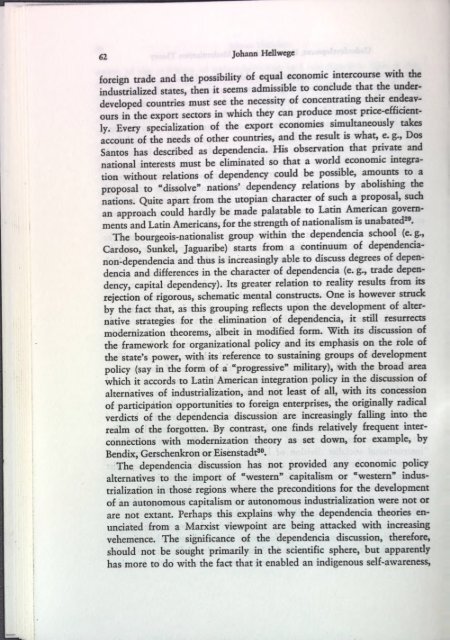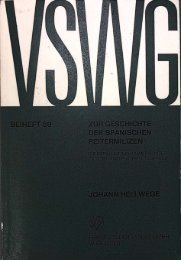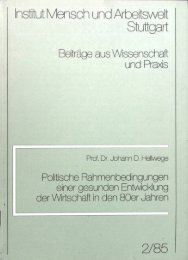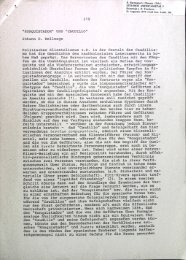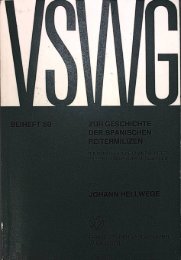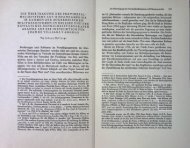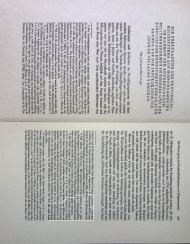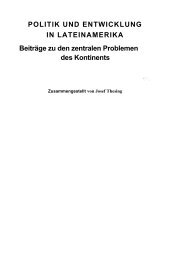9_Law and State_Volume 17
Create successful ePaper yourself
Turn your PDF publications into a flip-book with our unique Google optimized e-Paper software.
62<br />
Johann Hellwege<br />
foreign trade <strong>and</strong> the possibility of equal economic intercourse with the<br />
industrialized states, then it seems admissible to conclude that die underdeveloped<br />
countries must see the necessity of concentrating their endeavours<br />
in the export sectors in which they can produce most price-efficiently.<br />
Every specialization of the export economies simultaneously takes<br />
account of the needs of other countries, <strong>and</strong> the result is what, e. g., Dos<br />
Santos has described as dependencia. His observation that private <strong>and</strong><br />
national interests must be eliminated so that a world economic integration<br />
without relations of dependency could be possible, amounts to a<br />
proposal to “dissolve” nations’ dependency relations by abolishing the<br />
nations. Quite apart from the utopian character of such a proposal, such<br />
an approach could hardly be made palatable to Latin American governments<br />
<strong>and</strong> Latin Americans, for the strength of nationalism is unabated-9.<br />
The bourgeois-nationalist group within the dependencia school (e. g.,<br />
Cardoso, Sunkel, Jaguaribe) starts from a continuum of dependencianon-dependencia<br />
<strong>and</strong> thus is increasingly able to discuss degrees of dependencia<br />
<strong>and</strong> differences in the character of dependencia (e. g., trade dependency,<br />
capital dependency). Its greater relation to reality results from its<br />
rejection of rigorous, schematic mental constructs. One is however struck<br />
by the fact that, as this grouping reflects upon the development of alternative<br />
strategies for the elimination of dependencia, it still resurrects<br />
modernization theorems, albeit in modified form. With its discussion of<br />
the framework for organizational policy <strong>and</strong> its emphasis on the role of<br />
the state’s power, with its reference to sustaining groups of development<br />
policy (say in the form of a “progressive” military), with the broad area<br />
which it accords to Latin American integration policy in the discussion of<br />
alternatives of industrialization, <strong>and</strong> not least of all, with its concession<br />
of participation opportunities to foreign enterprises, the originally radical<br />
verdicts of the dependencia discussion are increasingly falling into the<br />
realm of the forgotten. By contrast, one finds relatively frequent interconnections<br />
with modernization theory as set down, for example, by<br />
Bendix, Gerschenkron or Eisenstadt30.<br />
The dependencia discussion has not provided any economic policy<br />
alternatives to the import of “western” capitalism or “western” industrialization<br />
in those regions where the preconditions for the development<br />
of an autonomous capitalism or autonomous industrialization were not or<br />
are not extant. Perhaps this explains why the dependencia theories enunciated<br />
from a Marxist viewpoint are being attacked with increasing<br />
vehemence. The significance of the dependencia discussion, therefore,<br />
should not be sought primarily in the scientific sphere, but apparently<br />
has more to do with the fact that it enabled an indigenous self-awareness,


